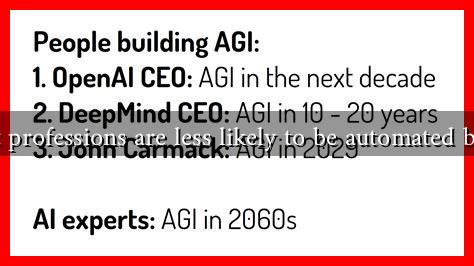-
Table of Contents
What Professions Are Less Likely to Be Automated by AI?
As artificial intelligence (AI) continues to evolve, the fear of job displacement looms large in many industries. However, not all professions are equally susceptible to automation. Understanding which jobs are less likely to be automated can help individuals make informed career choices in an increasingly AI-driven world. This article explores various professions that are more resilient to automation, supported by research, examples, and statistics.
The Nature of Work: Human Skills vs. Machine Efficiency
To determine which professions are less likely to be automated, it is essential to consider the skills that AI struggles to replicate. Jobs that require emotional intelligence, creativity, complex problem-solving, and interpersonal communication are generally safer from automation. According to a report by McKinsey, about 60% of all occupations have at least 30% of activities that could be automated, but the remaining 40% require distinctly human skills.
Professions Less Likely to Be Automated
Here are some professions that are less likely to be automated by AI:
- Healthcare Professionals: Doctors, nurses, and therapists rely heavily on human interaction, empathy, and complex decision-making. For instance, while AI can assist in diagnostics, the nuanced understanding of patient care remains a human domain.
- Creative Professionals: Artists, writers, and designers utilize creativity and emotional expression, which are challenging for AI to replicate. A study by the World Economic Forum suggests that creative jobs are among the least likely to be automated.
- Education Professionals: Teachers and educators play a crucial role in shaping young minds. The ability to inspire, mentor, and adapt teaching methods to individual student needs is a distinctly human trait.
- Skilled Trades: Electricians, plumbers, and carpenters perform hands-on tasks that require dexterity, problem-solving, and adaptability. These jobs often involve unpredictable environments that AI cannot easily navigate.
- Social Workers and Counselors: These professionals provide emotional support and guidance, requiring a deep understanding of human emotions and social dynamics that AI cannot replicate.
Case Studies and Statistics
Several studies highlight the resilience of certain professions against automation. For example, a report from the Brookings Institution indicates that jobs in healthcare are projected to grow by 15% from 2019 to 2029, significantly outpacing other sectors. This growth is driven by an aging population and the increasing complexity of healthcare needs.
Moreover, a survey conducted by PwC found that 38% of jobs in the U.S. could be automated by the early 2030s, but roles requiring human interaction, such as healthcare and education, are less likely to be affected. The survey emphasizes that while AI can enhance productivity, it cannot replace the human touch essential in these fields.
Preparing for the Future Workforce
As AI continues to advance, individuals should consider developing skills that complement technology rather than compete with it. Here are some strategies to prepare for a future where AI plays a significant role:
- Focus on Soft Skills: Enhance your emotional intelligence, communication, and interpersonal skills, which are invaluable in many professions.
- Embrace Lifelong Learning: Stay updated with industry trends and continuously seek opportunities for professional development.
- Leverage Technology: Learn how to work alongside AI tools to improve efficiency and productivity in your field.
Conclusion
While the rise of AI presents challenges, it also opens up opportunities for individuals in professions that require uniquely human skills. Healthcare, creative fields, education, skilled trades, and social work are among the careers less likely to be automated. By focusing on developing soft skills and embracing lifelong learning, individuals can position themselves for success in an evolving job market. As we move forward, understanding the interplay between AI and human capabilities will be crucial in navigating the future workforce.
For more insights on the impact of AI on jobs, you can visit World Economic Forum.

